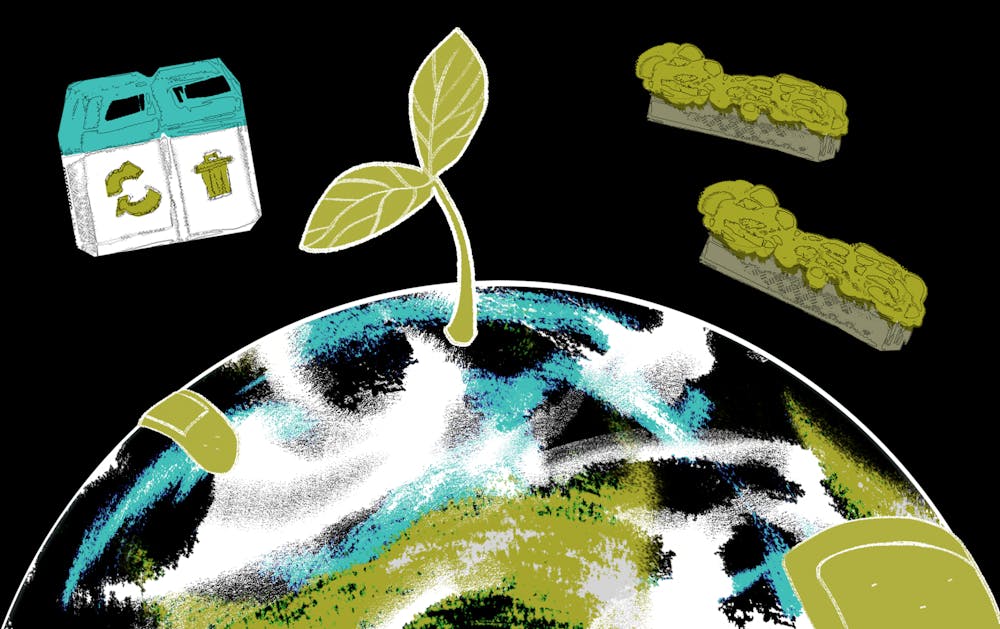ASU received the Sustainability Tracking, Assessment & Rating System platinum rating this year for sustainability based on efforts to put sustainable practices into place on campus and in the community, making the University one of nine institutions in the world to earn that rating.
STARS, which is administered by the Association for the Advancement of Sustainability in Higher Education, is a self-reporting program that higher education institutions can use to measure their sustainability efforts. The program helps encourage long-term sustainability goals for each institution.
The STARS program evaluates aspects such as facilities, academics, planning, investments, emissions, operations, research and engagement.
"A university needs to reach a certain threshold to qualify for platinum, which is 85% of the possible points and stars," said Chris Pelton, STARS program manager. "STARS sets really ambitious targets for different things so 85% is a really incredible achievement for an institution to get."
ASU scored a total of 87.1 points and received its highest marks on the air and climate section of the STARS scorecard, with a perfect score out of 11. Its lowest scores were on the University grounds, earning one out of two points for landscape management and zero out of one point for biodiversity.
The first sustainability effort ASU focuses on in its eight-point sustainability goals and vision is its Zero Waste initiative. One of the main goals of the initiative is to divert 90% of ASU's waste out of landfills to recycle or compost them by 2025. According to the Zero Waste annual report in 2019, around 42% of the University's waste was diverted from landfills.
Another one of Zero Waste's goals is to educate students about recycling and composting initiatives on campus.
“We work with housing on different campaigns to run in the residence halls to educate about these values. For example, we have begun working with a student pilot in Vista del Sol to create a compost collection," said Kendon Jung, program manager for Zero Waste. "After opening on March 13, 2019, we had over 57 bins requested within the first week. It has been one of our most successful pilots in terms of low contamination, high participation and frequency of participation.”
People can look up any object on Zero Waste’s website to see if and where it can be recycled.
“This world is not going to get any better, especially from an environmental standpoint, if we don’t take the extra second or two to correctly put whatever the item is in the right recycling bin," Jung said. "We need to have the self efficacy to say, ‘Yes, I have a personal responsibility to take care of the planet.'"
Caitlyn Finnegan, a junior studying sustainability, spent last summer doing research about plastic pollution and marine conservation as it relates to the impacts of the 2016 pink salmon disaster that took place in the Gulf of Alaska.
“I realized the way people are treating the environment and our natural resources is disgusting," Finnegan said. "They act as if they are above nature and that it’s ours to conquer when in reality we are just a small part of it.”
When it comes to trying to live a more sustainable life, Finnegan said a person should try to limit their plastic use as much as possible.
"For example, you can purchase a cardboard laundry detergent box instead of a plastic container or use a reusable water bottle instead of a plastic one," Finnegan said. "Little changes to your daily routine make a big difference in the long run."
Finnegan said in order to see positive change in the health of the environment, people must commit to making lasting changes to their habits.
“I don’t think people understand how important this issue is and how real climate change is," Finnegan said. "Our actions are truly affecting the planet, and if nature isn’t there anymore to support us, we will no longer be able to survive.”
Reach the reporter at lkobley@asu.edu and follow @LKobley on Twitter.
Like The State Press on Facebook and follow @statepress on Twitter.

Lauren Kobley is a reporter for the Community and Culture desk at The State Press. She has previously interned with the Fountain Hills Times.




